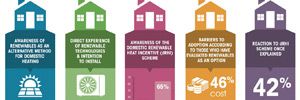
New research commissioned by Daikin UK gives an insight into UK homeowners’ awareness and experience of renewable technologies and the domestic Renewable Heat Incentive (dRHI) scheme.
The survey of 1,000 homeowners indicates that general awareness of renewable technologies is reasonably high, with 61% saying that they have heard of at least one of these types of system: air-to-water heat pumps, ground source heat pumps, solar thermal, solar PV or hybrid heating systems (traditional boiler combined with a renewable technology). Only a third (36%) of the sample claim they have no knowledge whatsoever of any of the technologies named.
More people say they are aware of heat pumps (53%) than any other renewable technology, followed by solar thermal (42%), and solar PV (31%). A quarter (25%) of those questioned are also familiar with hybrid systems combining a renewable energy with a boiler.
However, the number of those with direct experience is considerably lower. Just 17% of homeowners have had any sort of interaction with a renewable technology, while only four per cent have had one the technologies mentioned installed in their own home.
Encouragingly, a further five per cent – which equates to 900,000 households when applied nationally – say they are planning to have a renewable technology installed within the next 12 months, and an equivalent of an additional 1.3 million households (or eight per cent) say they plan to take the plunge at some point in the future.
The research identifies a strong relationship between direct experience and an intention to purchase. Seventy per cent of those planning an install within the next 12 months have had direct experience of at least one of the technologies, but, conversely, of those who’ve considered but rejected the idea, only two per cent have had the same direct experience.
Unsurprisingly, solar PV has the most exposure, with seven per cent having direct experience, followed by solar thermal (five per cent), and ground source, air-to-water and hybrid each having been experienced by three per cent of homeowners.
Awareness of the dRHI however is modest, with just over a third (35%) acknowledging any form of awareness. Of these, 14% say they’re aware of the term but don’t know anything about it; one in ten say they’re familiar, but don’t fully understand; eight per cent are fully aware, but haven’t taken advantage of it; and four per cent have already applied.
Unsurprisingly, awareness of dRHI is higher amon those living in off-gas properties (which typically have highest fuel bills), than their on-gas neighbours (44% vs 32%).
Encouragingly, of those surveyed who have already installed a renewable technology, over half (54%) have taken advantage of, or applied for, the dRHI. The research also indicates a correlation between those who are familiar with dRHI and who have had some interaction with a renewable product, suggesting those in the know are engaging with the funding options available to them.
The reaction to dRHI once the scheme was explained to surveyed homeowners is positive. Two in every five (42%) homeowners think it’s a good idea, a quarter (24%) think it will encourage the adoption of renewable technologies, and almost one in five (17%) go as far as saying they think it will fundamentally change the way British homes are heated in the future.
The research also examined the reasons those who have considered but ultimately not installed a renewable system made their decision. The top three reasons cited are being unable to afford the initial financial outlay (46%), not knowing enough about it (46%), and the return on investment not being sufficient (21%). Of those s
